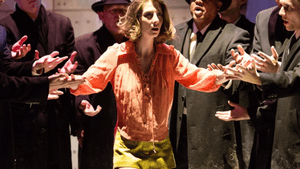Stay in the Loop
BSR publishes on a weekly schedule, with an email newsletter every Wednesday and Thursday morning. There’s no paywall, and subscribing is always free.
Of vice and men
Opera Philadelphia's presents 'Breaking the Waves' (second review)

Opera Philadelphia’s world premiere Breaking the Waves, based on the 1996 Lars von Trier film, opened to some acclaim, with at least one critic declaring it among the best 21st-century operas yet produced. It’s the brainchild of librettist Royce Vavrek and composer Missy Mazzoli, and it certainly was produced in the 21st century. It’s a production, led by conductor Stephen Osgood, of fine performances in service of what might charitably be described as a questionable goal.
Breaking the Waves is the story of Bess, a young woman on the Isle of Skye with a history of mental illness. She falls in love with Jan, a Norwegian working on an offshore oil rig. When Jan is paralyzed in an accident, he demands that Bess have sex with other men; she does, which earns her the condemnation of her insular Presbyterian community. They shun her, and Jan’s condition worsens. In a final, desperate act, Jan gives herself to two sadistic sailors, who rape and murder her. This sacrifice restores Jan to health, and is subsequently sacralized by a miracle: ghostly church bells ring out at her funeral.
The good news
It’s easy to be moved by this production. The cast, led by Kiera Duffy and John Moore as Bess and Jan, are excellent. Duffy’s voice is beautiful and expressive, and the anguish she experiences over her confusion and degradation is powerful. The characters are fenced in by Adam Rigg’s set, vast and brutalist, made of riveted steel and shattered wooden planks giving the impression of an industrial ocean frozen in time. It’s quite lovely, even if director James Darrah often makes baffling use of it, cramming the action off into the corners and along its edges.
And there are some moments of shocking, almost mythic intensity. In an early moment with Bess at a funeral, the 12 men of the chorus, in black coats and fedoras, open their bibles to pour ashes from them; later, the men of the congregation hurl their bibles at Bess in an ersatz, Old Testament stoning.
Missy Mazzoli’s score is at its most expressive when it’s most cruel. For instance, when Bess is carried off by the sailors who will murder her, the chorus sings her away with waves of downward slides. It’s a grace note during which the libretto is conspicuously, and perhaps tellingly, absent.
Rotten at the root
The deep problem at the root of this piece is whether or not this is a story worth telling at all. It’s hard to experience this narrative as anything but profoundly predatory. Jan flatly coerces his wife into extramarital sex, an act that she consents to but clearly never enjoys. He seems to feed not on the compersion that fuels a more ethically complex marriage, but instead on her sense of degradation. Bess isn’t even given the simple courtesy of being permitted to enjoy sleeping around.
Even if Breaking the Waves didn’t rest at the tail end of a genre defined by women sacrificing themselves — their lives, agency, or identity — Bess’s particular sacrifice would be more than worrying. She seems incapable of an identity outside of her husband (she thrills at the thought of becoming “Mr. and Missus Jan from the Rig”), and her notion of devotion to him is the annihilation of herself in service to his needs. After Bess’s “sacrifice” — again, a sacrifice in which she permits herself to be raped and murdered by sadists because she believes it will cure Jan – Dr. Richardson, a doctor from outside her community, diagnoses her condition not as psychotic, but as “goodness.”
Bess’s fundamental flaw, described aggravatingly often but never with any depth, is an overabundance of “goodness.” But the goodness evoked here is not a hard-won virtue or a well-considered principle. It’s not even a revelatory, mystic love. It’s an almost pathetically simple-minded deference, from one domineering, male-dominated culture to a single domineering male.
Past its expiration date

There’s almost a way to look at this story that’s perhaps brutally tragic: It’s the story of a vulnerable young woman with little personality or life of her own, slowly being ground to dust between two inexorable male powers, her community on the one side, her husband on the other. But Breaking the Waves isn’t that story, because Bess’s utter sacrifice to her husband’s sexual demands is rewarded with not just one, but two genuine miracles.
Ten or 15 years ago, uncritically plucking a story from Lars von Trier’s oeuvre of grim, chauvinist nihilism might have passed without comment. It’s a classic film and world renowned, and if the project of opera is simply to repeat well-regarded ideas and set them to music, then an adaptation of Breaking the Waves is as good as any other bad idea excavated and trussed up with a chamber orchestra.
We’re well into the 21st century now. We might say there’s a moral responsibility to consider whether or not all this beautiful design, this embarrassment of talent, and the tremendous amount of money required to mount a production like this, ought to be marshalled in the service of an idea that is at best an archaic example of the worst the genre has to offer, and at its worst is genuinely monstrous.
To read Steve Cohen's review, click here.
What, When, Where
Breaking the Waves. Music by Missy Mazzoli, libretto by Royce Vavrek, adapted from Lars von Trier's film. James Darrah directed, Steven Osgood conducted. Through Oct.1, 2016 at the Perelman Theater, Kimmel Center, Broad and Spruce Sts. (215) 732-8400 or operaphila.org.
Sign up for our newsletter
All of the week's new articles, all in one place. Sign up for the free weekly BSR newsletters, and don't miss a conversation.

 Chris Braak
Chris Braak